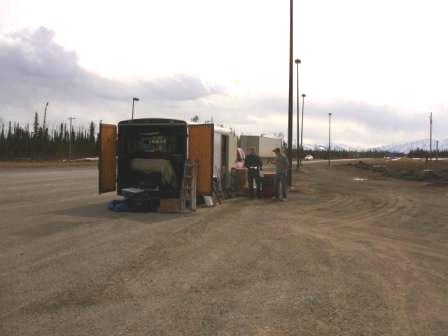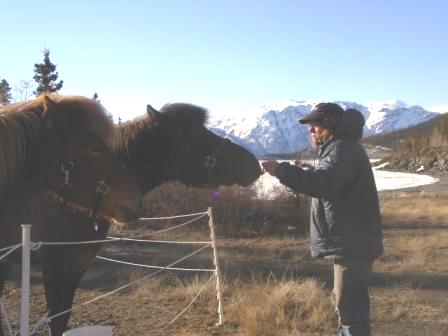
Home > Trip > Dispatches > Trip South > Dispatch #2
Dispatch #2, Tuesday, May 3: Tok, AK to Bayshore Motel campsite (Kluane Lake) Yukon Territory
Part I: This ain’t no Kinkos And so, we arrived at Beaver Creek, YT, having been assured by just about everyone that getting through Canadian customs would be a breeze. We didn’t stop beforehand and make sure our paperwork was in order because we really believed what our friends told us. We instead drove up the customs area, pulled out our passports, the dog’s health certificate, and the manila envelope from the federal veterinarian with the two Coggins certificates. We then handed the passports to the customs agent, along with the Coggins certificates. He did not ask for Rainbow’s papers. The horses were |
 |
||||||
|
moving about, but the dog was wisely laying low. Bad news generally takes a bit of time to reach the intended in such places, and this was one of those times. “There’s a problem here,” the customs agent finally intoned. Pete and I sat still, and waited for him to finish his statement. After flipping through our documentation yet another time, he said, “You have two of the same copies of one certificate. “See? This one says Raudi. And so does this one.” The customs agent then asked us to pull over to the side area, aka purgatory, or that no person land between Canada and the U.S, that is the place where all those who have messed up their paperwork are sent. What went unsaid was that we either needed to produce the right documentation or return whence we came. No metaphor here, just evidence to support my assertion. The sun wasn’t shining and it wasn’t cloudy. No man’s land is just a Godforsaken wilderness. I sat and took in what didn’t exist. I knew one thing for sure, and this was that this wasn’t where I intended to spend the rest of my life. Pete and I went through our metal gray file box, file by file, me pulling them out, riffling through them, and then tossing them to him. Got no extra copy – hmmph – I stopped long enough to chide the poor guy for not checking the envelope when the federal veterinarian returned it to him five days before. He’d given it to me at home, and I’d slipped the manila envelope in the box. At that time, a lot was going on. Neither of us wrote “Check health certificate papers” on the list. Pete went into the building to straighten out the matter. This, I thought, is hardship. But it isn’t the kind of hardship that physically hurts. This was the kind of hardship that hurts mentally. If say, we had to return to Tok, we’d be majorly inconvenienced. I tried not to think about this and instead focused on the outer landscape. There was a burn barrel to my right, and straight ahead, an open trailer with all kinds of personal junk in it, like a blue foam pad and a funky looking sofa. To the side of trailer was a fellow, 20-ish, smoking a cigarette, and trying to look industrious. Three guns had been set up against the side of his trailer. Oh, I thought, this was the area for ALL who lack the requisite paperwork. But you’d think someone crossing an international border with weapons would have their act together. The horses were growing increasingly more restless. A sign to my left read “Restrict animals to vehicles.” It then crossed my mind that I might take Raudi out of the trailer and head on down the road – after all, her health certificate papers were in order. Pete returned and said that he’d left
a message for Dr. Wellington, telling him to fax us Siggi’s
paperwork. “How much time?” I asked. “I have no idea.” “Well, let’s give him a few hours, then if we don’t get a hold of him, head back to Tok.” “Good idea.” I watched, jaw set, as he began rummaging around for a computer stick, his thought being that perhaps he’d downloaded it onto the device. If say, Pete had a copy, we could have the customs agents print it up. No dice. It was not on the one he had on hand. Pete, bored, went over and inspected the contents of the burn barrel. He then announced that it contained four cans of diet soda. So, I thought, this is what people in Purgatory drink. Pete, undaunted, disappeared for a bit, and then returned with yet another stick. This one, as it turned out, had Siggi’s form on it. This time, we both went into the building. No, we were told, a computer copy of this document wouldn’t cut it. And they couldn’t print up what we had on hand because our stick might have viruses on it. Oh well. It was at this point in time that fortunately, the faxes from the veterinarian came through. It seemed to me that the counter clerk took great delight in showing us that they were three-quarters blank. Pete returned and called Dr. Wellington, who this time sent the paperwork to the customs agent via email Our stay in no man’s land came to an end with the customs agents having the right forms in hand. Pete, of course, asked if we could have extra copies of Siggi’s paperwork, to which he was told “yes, but remember, this ain’t no Kinkos.” Quickly, we hopped in the truck and left, for fear that the customs agents might find yet another reason to keep us in Purgatory. Later that evening I asked Pete what the high point of his day was and he said “Leaving Beaver Creek,” to which I said, “ditto.”
|
|||||||
